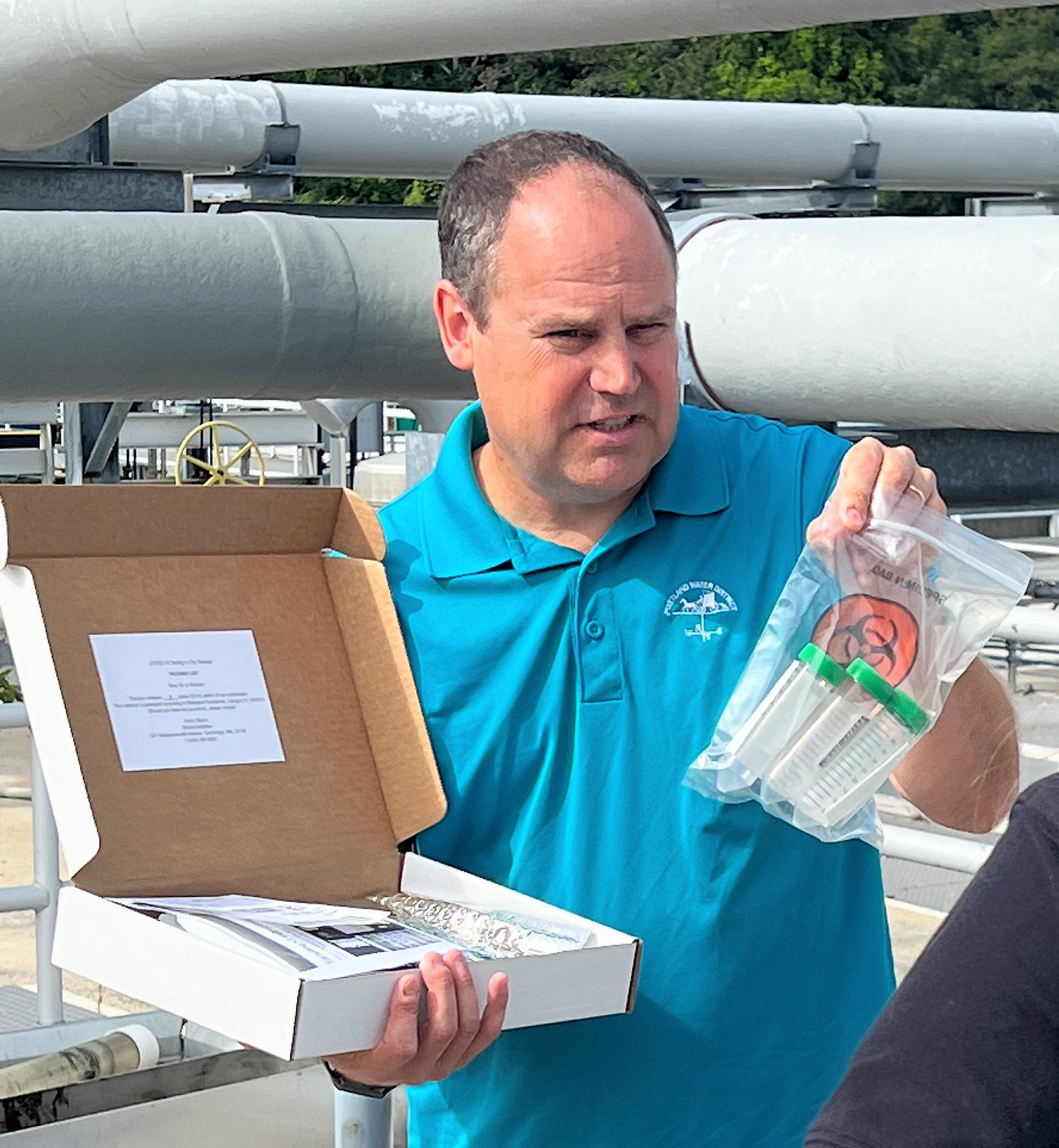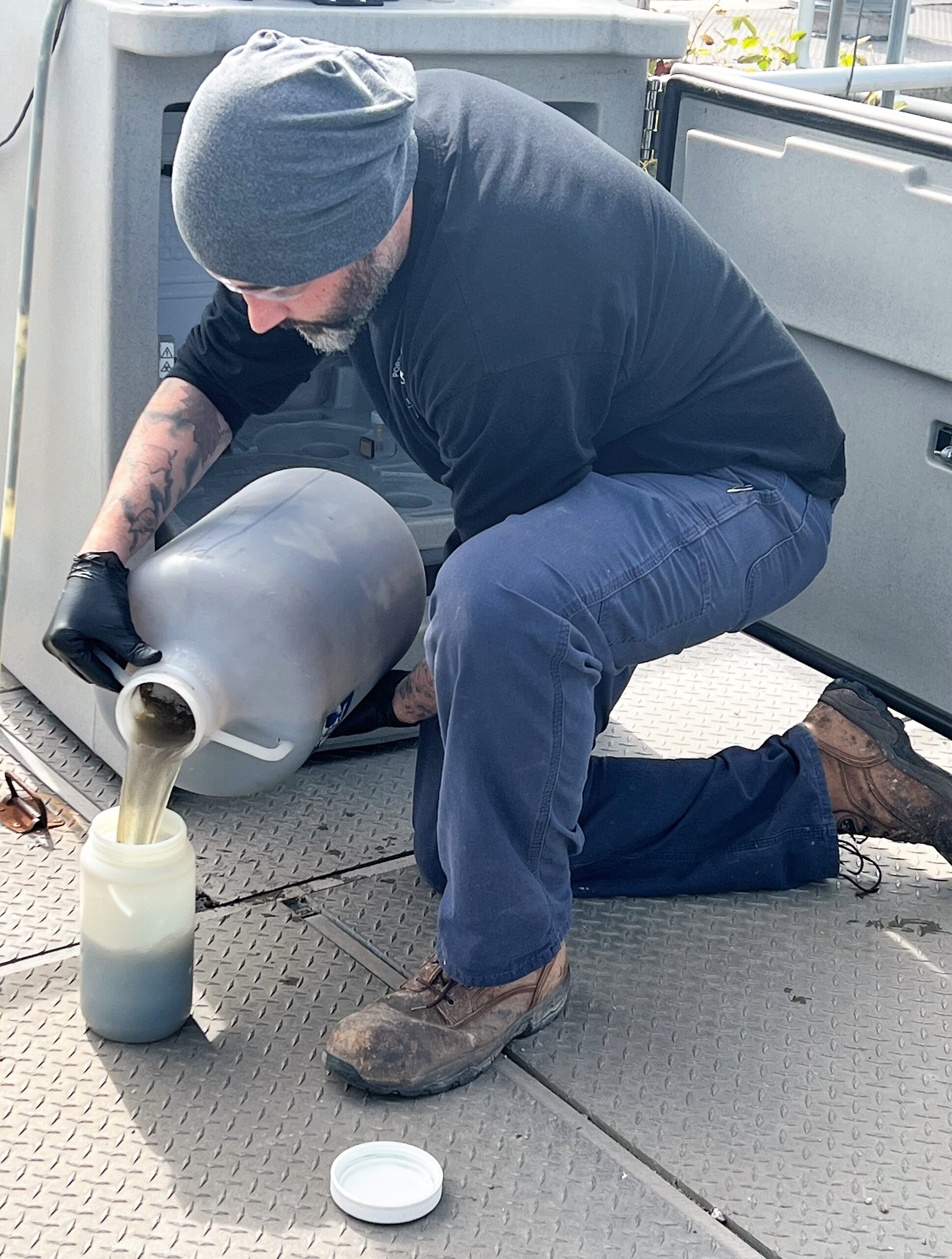Maine wastewater utility provides valuable community virus testing
September 19, 2022

AWWA Articles
Maine wastewater utility provides valuable community virus testing
Three times a week, operators at the Portland Water District in Maine unpack a test kit box.
 They pull out ice packs, an insulated bag, shipping label, paperwork and plastic containers. Then they dip a jug into the plant’s influent composite sampler, shake it up and pour the wastewater into sample containers, ready to ship to a lab for testing.
They pull out ice packs, an insulated bag, shipping label, paperwork and plastic containers. Then they dip a jug into the plant’s influent composite sampler, shake it up and pour the wastewater into sample containers, ready to ship to a lab for testing.
There, scientists study the samples, and within 48 hours, deliver results to state public health officials. The results help communicate more about the community presence of viruses that cause COVID and now other diseases, too — monkeypox, influenza A, RSV and other COVID variants.
“It’s a great public service,” said Scott Firmin, director of wastewater services at the Portland Water District (PWD). “We’re part of this community, and this is another way we can add value to our customers in an unexpected way.” (Pictured left, Firmin shows a wastewater sampling kit.)
People excrete genetic evidence of viruses in their waste, often before they know they’re infected. PWD’s results, as well as data from dozens of other utilities, will soon be available on wastewaterscan.org, a nationwide effort to track pathogens across communities.
Scientists have known about the potential for wastewater-based epidemiology for decades. Treatment plants in Israel, for example, have monitored for polio since the late 1980s, according to WastewaterSCAN.
The COVID pandemic accelerated that effort, and by summer 2020, wastewater utilities across the nation, including PWD, were collecting samples for researchers to study COVID trends in their communities.
Expanding testing to track more viruses
 In July 2022, Verily, a health-analytics company, contacted PWD to see if its East End Wastewater Treatment Plant — which serves about 65,000 people, making it the largest in the state — could participate in an expanded monitoring program to test for monkeypox, influenza A, RSV and COVID variants. (Pictured right, PWD staff collecting a wastewater sample.)
In July 2022, Verily, a health-analytics company, contacted PWD to see if its East End Wastewater Treatment Plant — which serves about 65,000 people, making it the largest in the state — could participate in an expanded monitoring program to test for monkeypox, influenza A, RSV and COVID variants. (Pictured right, PWD staff collecting a wastewater sample.)
Now, PWD sends samples to Biobot Analytics to test for COVID and will soon send additional samples to Verily, as part of the WastewaterSCAN program. Maine Center for Disease Control and Prevention, not PWD, interprets results and makes public health recommendations.
“We’re taking a sample we’re already collecting with equipment we already have and making that available to somebody who can make these types of decisions,” Firmin said. “While we have a public health role, it’s not taking this type of information and getting community action.”
Though there’s no way to identify who in the community has the virus, sampling can detect as few as two infected people among 100,000, according to WastewaterSCAN.
 Since PWD began monitoring for COVID two years ago, the data has helped scientists make reliable predictions about COVID waves. “Over time, it has really indicated trends before you see them clinically,” said Michelle Clements, public relations manager at PWD.
Since PWD began monitoring for COVID two years ago, the data has helped scientists make reliable predictions about COVID waves. “Over time, it has really indicated trends before you see them clinically,” said Michelle Clements, public relations manager at PWD.
At first, the utility, which also delivers drinking water to 210,000 people in southern Maine, faced some public confusion in explaining that drinking water is safe even when there’s genetic evidence of COVID in wastewater.
But now that wastewater epidemiology is becoming more widespread, people understand there’s not a public health threat from sampling sewage for viruses. Instead, it’s a great way to show PWD’s commitment to public health.
“It builds awareness and gets people thinking about the importance of wastewater utilities,” Clements said.
Federal and philanthropic funds pay for the program; there is no cost to PWD to participate. And though operators have had to make some scheduling changes to collect an extra sample, it’s a worthwhile cause, Firmin said.
“What excited me about this opportunity is that we’re helping collect important information that we can’t get otherwise,” he said. “This elevates the importance of wastewater-based epidemiology.”
Advertisement